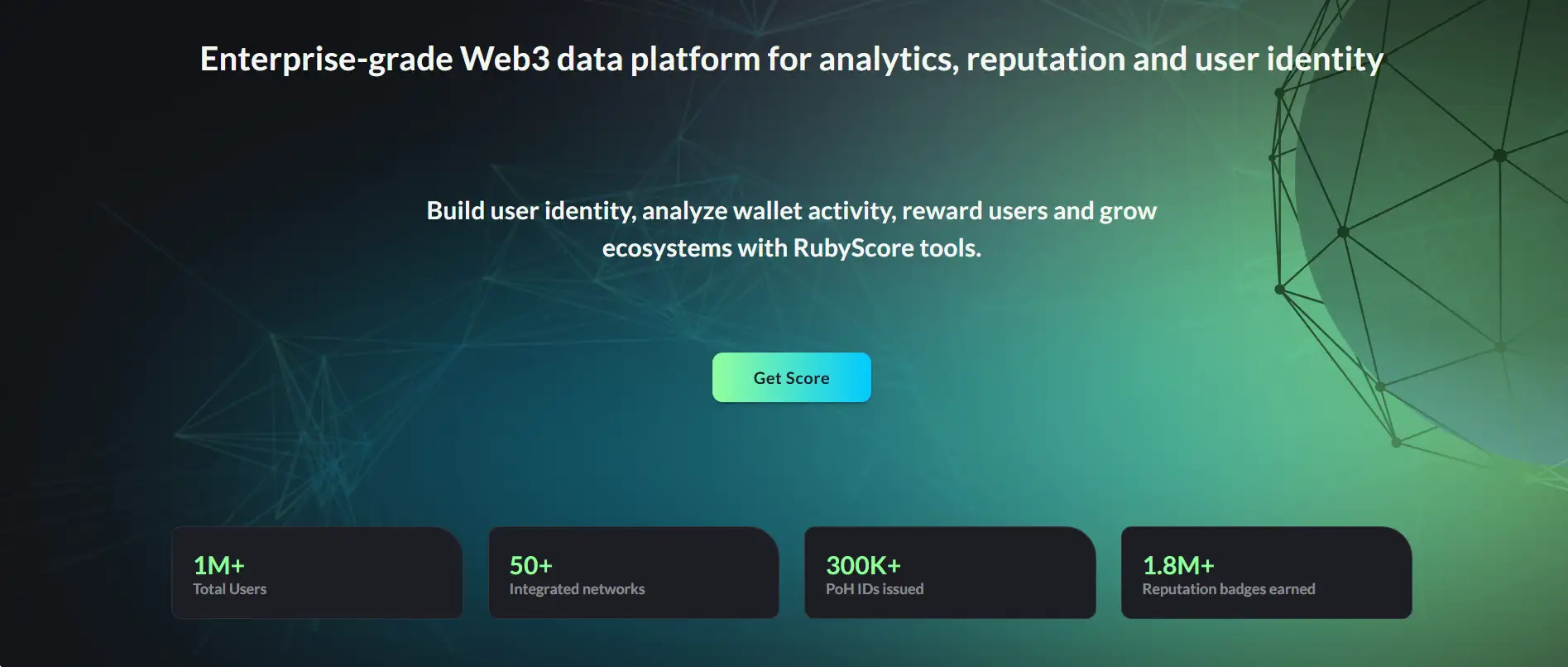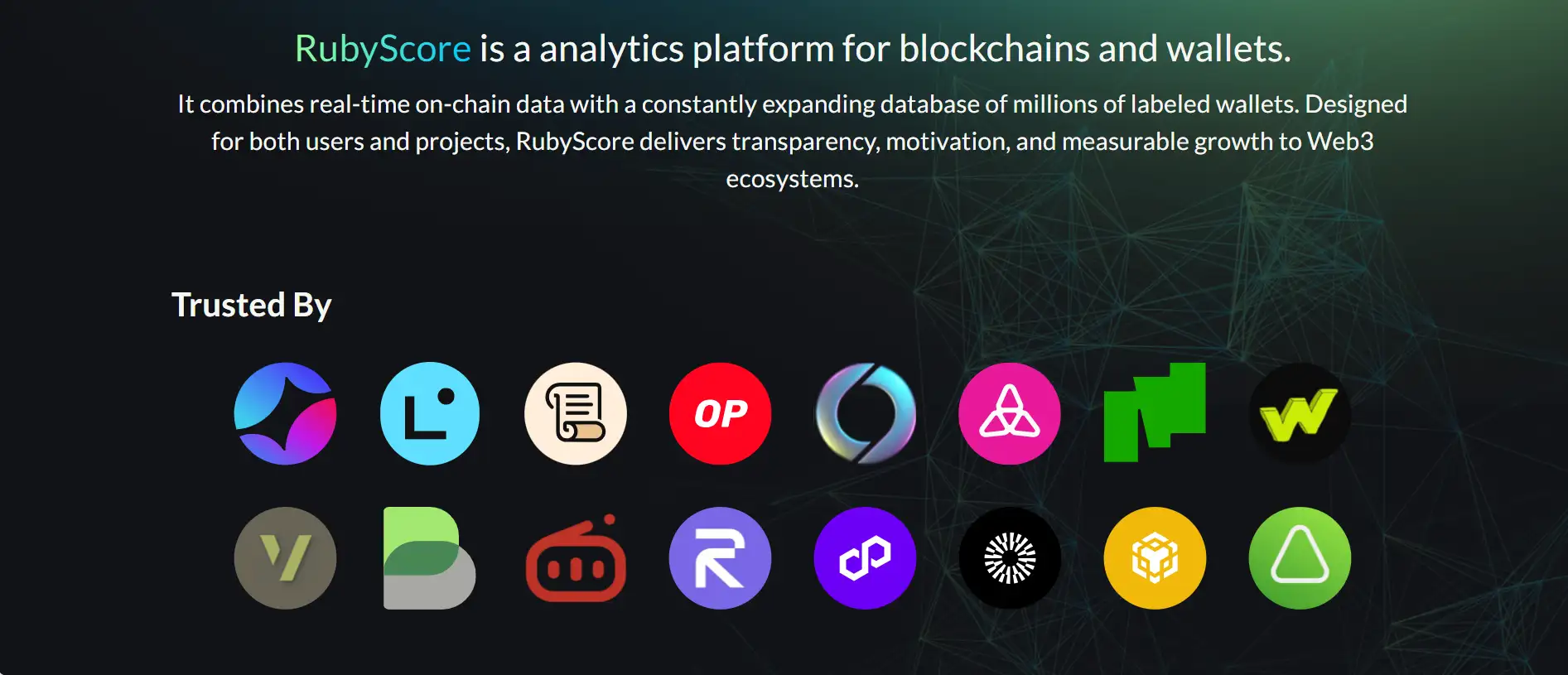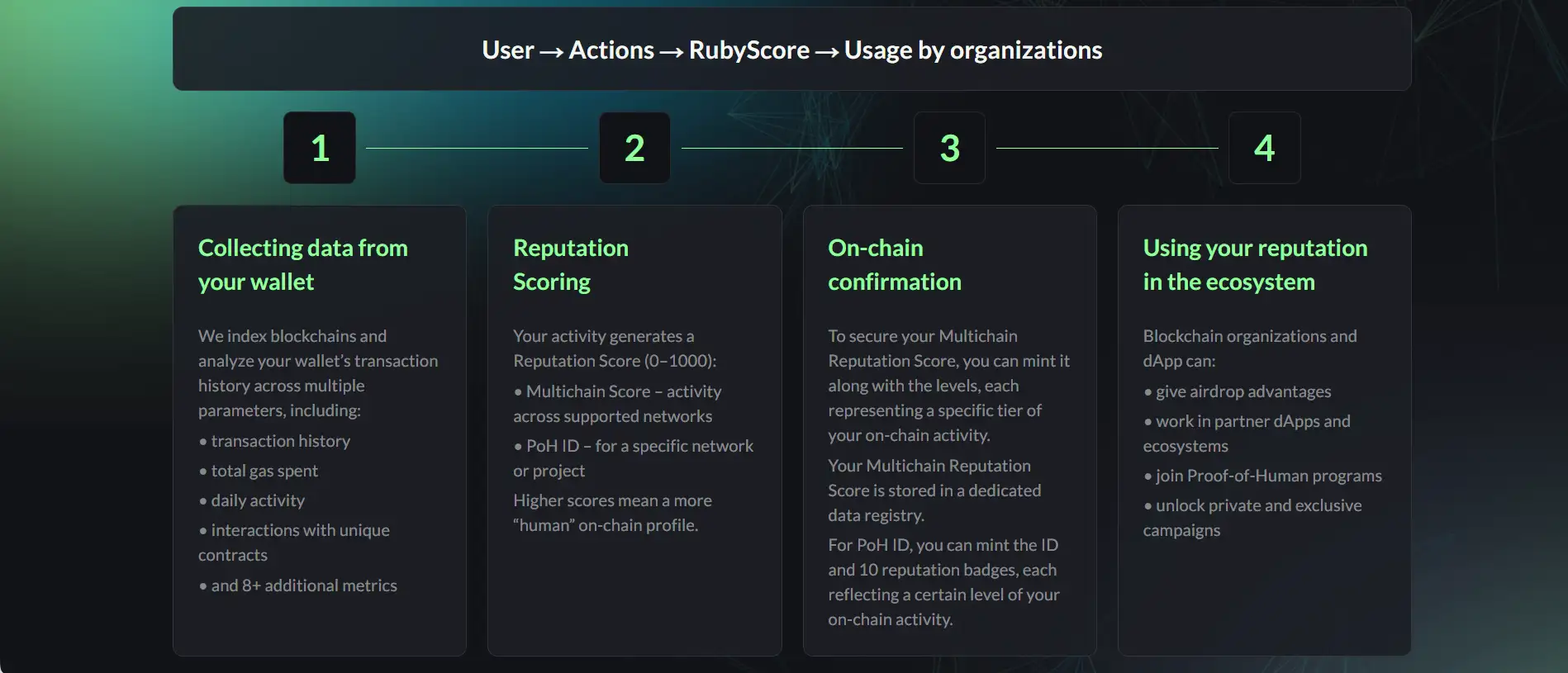About RubyScore
RubyScore is an enterprise-grade Web3 data platform designed to provide powerful tools for blockchain analytics, user reputation, and identity verification. As a decentralized reputation protocol, RubyScore transforms raw on-chain activity into usable insights that empower both individual users and blockchain ecosystems to grow with confidence.
Built on real-time data collection from over 50+ integrated networks, RubyScore enables users to unlock a unique Multichain Reputation Score, access rewards and gated features, and verify their identity across chains. For projects, it offers a robust analytics layer, bot-resistant user filtering, and advanced engagement tools like quests, faucets, and ID systems. With more than 1 million users and 300,000+ PoH IDs issued, RubyScore is shaping the future of trust in Web3.
RubyScore was created to fill a critical gap in the Web3 landscape: the absence of a decentralized, transparent, and programmable way to verify wallet behavior and user quality. As Web3 projects increasingly face issues like bot manipulation, airdrop abuse, and low-quality user engagement, RubyScore offers a scalable and verifiable solution. It serves as the foundational reputation layer for blockchains and dApps, indexing wallet activity and assigning reputation scores that reflect genuine on-chain engagement.
At the heart of RubyScore is the Multichain Reputation Score (MRS), a number between 0 and 1000 that quantifies a wallet’s behavior across networks. This score is based on more than eight metrics including transaction frequency, gas usage, unique contract interactions, and daily activity. Users can mint their scores and badges on-chain, turning ephemeral wallet activity into permanent, verifiable identity markers. This makes it possible to build real trust—one wallet at a time.
RubyScore also issues Proof-of-Human (PoH) IDs, which are unique on-chain identifiers associated with a user’s activity level. These IDs are white-label ready, allowing projects to adopt them into their own ecosystems to fight bots, validate participation, and run secure campaigns. With this infrastructure, blockchain ecosystems can finally evolve from primitive wallet-based interaction models to more nuanced systems that value verified human behavior and long-term engagement.
Real-world use cases of RubyScore include airdrop protection, testnet faucet filtering, governance validation, whitelist management, and beta testing access control. Instead of relying on rigid allowlists or inefficient captchas, projects can query RubyScore’s API to verify eligibility in real time. This makes incentive distribution not just safer, but smarter—driven by a dynamic scoring system rather than static identity checks.
Compared to platforms like Dune, Nansen, or Flipside Crypto, RubyScore takes a user-centric approach. It doesn’t just observe data—it transforms it into identity, score, and status. Its combination of data indexing, scoring mechanisms, identity verification, and gamified systems places it in a category of its own as the trust and reputation engine for Web3.
RubyScore provides numerous benefits and features that make it an essential protocol for modern Web3 ecosystems:
- Multichain Reputation Score (MRS): A unified, cross-network score reflecting real wallet activity and behavior across 50+ chains.
- Proof-of-Human ID: Mintable, white-labeled IDs and badges that validate the “humanity” of users based on on-chain behavior.
- Gamified Reputation Quests: Projects can boost engagement through quest systems tied directly to score improvements and reward eligibility.
- Advanced Blockchain Analytics: Access dashboards for wallet and network metrics including TVL, gas spent, balances, and smart contract interactions.
- Deferred Transaction Service: Support for bulk, scheduled, and gas-optimized transactions across supported blockchains.
- Bot-Resistant Campaigns: Use reputation scores and PoH to filter out sybils and ensure only verified users access token sales, faucets, or contests.
- API for Developers: Integrate RubyScore data into your dApps and platforms through enterprise-grade APIs.
- RS-Points Program: Reward users directly for engaging with your ecosystem via RubyScore’s RS-Points incentive structure.
- Data Monetization: Projects and researchers can access verified blockchain data for analytics, modeling, or research purposes.
- Ad Placement and Promotion: Promote your ecosystem directly on the RubyScore platform through strategic banner placements.
Getting started with RubyScore is quick and seamless for both users and developers, thanks to its intuitive design and on-chain integrations.
- Step 1 – Visit the Official Site: Go to rubyscore.io and connect your Web3 wallet from the homepage.
- Step 2 – View Your Score: Once connected, your Multichain Reputation Score will be calculated based on your existing on-chain activity across 50+ networks.
- Step 3 – Mint Your Identity: Mint your PoH ID and badges to secure your on-chain reputation. These can be used across dApps and partner ecosystems.
- Step 4 – Explore the Dashboard: Access detailed analytics, wallet history, and scoring metrics through your personal RubyScore dashboard.
- Step 5 – Complete Quests: Participate in reputation quests to boost your score, unlock airdrops, and earn rewards tied to your verified activity.
- Step 6 – For Projects: Integrate RubyScore into your platform via the RubyScore API to filter bots, manage access, and reward real users.
- Step 7 – Access Premium Features: Use services like the deferred transaction tool, whitelist verification, and blockchain data access to enhance your application or campaign.
RubyScore FAQ
Yes, RubyScore allows users to mint their Multichain Reputation Score (MRS) directly on-chain. When minted, this score becomes part of a user’s public on-chain profile and is stored in a dedicated registry. Users can also mint their Proof-of-Human (PoH) ID and associated reputation badges, making their identity portable and verifiable across Web3 ecosystems.
RubyScore uses over 8 metrics to evaluate wallet behavior, such as transaction frequency, contract interactions, gas spending patterns, and daily usage. These are aggregated into a Reputation Score that helps projects filter out bot-like behavior. High scores typically reflect human-like, diverse activity across networks, enabling better sybil-resistance for airdrops, quests, and more.
RS Points are part of the RubyScore rewards ecosystem. Users earn them by completing on-chain actions, participating in quests, and interacting with dApps that are integrated with RubyScore. These points can be used to unlock features, participate in exclusive campaigns, or qualify for partner airdrops. It’s a gamified system that transforms meaningful activity into incentives.
Yes, one of RubyScore’s primary use cases is testnet faucet protection. By analyzing wallet activity and assigning reputation scores, it helps projects ensure that testnet tokens go to real developers instead of bots. It filters requests by ID, score, and history, keeping testnet usage clean and fair.
RubyScore offers a robust Blockchain API for developers. Through the API, projects can access verified wallet data, reputation scores, PoH verification, and activity metrics across 50+ chains. This data can be used to manage access control, build quests, protect token claims, or power dashboards. Full API documentation is available via the official site.
You Might Also Like












